

Tao Te Ching
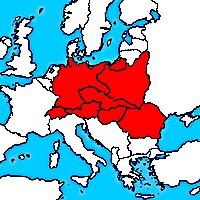
Central European Lineage
Netherlands, Germany, Switzerland, Austria, Hungary, Poland, Czech Republic, Lithuania, Bosnia, Luxembourg...
Although Germanic tribes occupied this area from ancient times, Germany didn't become a nation state until 1871. In the 10th century CE it became part of the Holy Roman Empire (a loose kind of partnership that included Germany, Austria, Bohemia, Holland, and Switzerland) of ), in the 16th century it became center for the Protestant Reformation center; and after the Holy Roman Empire collapsed, the German Confederation was formed in 1815. This lasted until the Weimar Republic formed after World War I which continued until Nazis seized power in 1933.
Poland established a state in 966 CE, the Kingdom of Poland in 1025, and—joining with Lithuania—became on of the 16th and 17th century's larges and most populous countries. Partitioned in the 18th century, it again became independent in 1918. Invaded by Germany and Russia in 1939, more than 6 million Poles were killed and a new Republic under Russian rule lasted from 1947 until it became a democratic republic in 1989. Like France and Great Britain who—after 1202—warred against each other 23 times; the German Empire/Weimar Republic/Nazi Germany/Federal Republic went to war 27 times since 1871.
People (40)

Hildegard of Bingen
1098 – 1179 CE
Circumventing her times’ strong prejudice and bans against women's social, artistic and theological participation, Hildegard became a famous writer, composer, botanist, philosopher, visionary, Christian mystic and the founder of scientific natural history in Germany. The first Westerner credited with describing the healing powers of food and corresponding with the political, religious, and scientific leaders of her day (popes, emperors, saints and scientists), she used her influence to combat corruption, promote spiritual insight, holistic healing, the arts, and women’s role in the world
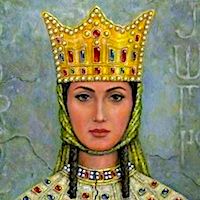
Tamar თამარ მეფე
1160 – 1213 CE
Tamar the Great
The first woman to rule Georgia and canonized by the Georgian Church; Tamar developed a powerful military, consolidated an empire, and supported the arts and many cultural advancements. Georgian history considers the time of her rule as the highest point of their Golden Age. She overcame intense resistance to a woman's rule that included exiling her first husband and defeating his coup attempts. Her dynastic heritage claimed descent from King David and her name has a Hebrew origin. Her two sons became the next two kings and she remains romanticized in legends still popular in contemporary Georgian culture.

Meister Eckhart (Eckhart von Hochheim)
1260 – 1328 CE
Philosopher, theologian, and mystic; Meister Eckhart represents a cultural and philosophical pivot at the end of the Middle Ages. In his own words but like Lao Tzu and the Buddha, he taught that Enlightenment is hidden inside our hearts and through emptiness, compassion and egolessness we become one. Though brought before the Inquisition and tried for heresy, his influence since includes from Schopenhauer (who said, “Buddha, Eckhardt, and I all teach essentially the same.”), to the Theosophical Society, to the politics of the UN’s Dag Hammarskjöld, to the psychology of Erich Fromm, to artists like Van Gough and Dürer, to authors like J. D. Salinger, and in modern times to theologians like Matthew Fox and Eckhart Tolle.

Erasmus (Desiderius Roterodamus)
1466 – 1536 CE
"Greatest scholar of the northern Renaissance"
"Prince of the Humanists,” famous translator, globalist and true citizen of the world; Erasmus emphasized a middle way approach between Luther and the Pope during the Reformation angering both sides. Not many know much about about him but his legacy is well known in the sayings and phrases he compiled and popularized. Some of his sayings like “The grass is always greener on the other side of the fence,” “God helps those who help themselves,” “Don’t put the cart before the horse,” “Leave no stone unturned,” “In the land of the blind the one-eyed man is king,” “No sooner said then done,” “Between a rock and a hard place,” “Call a spade a spade,” “Women – can’t live with them or without them,” “Like father like son,” “To look a gift horse in the mouth,” “To break the ice,” “To cut to the quick,” “One step at a time,” “A necessary evil,” “What’s done cannot be undone,” “Up to his eyeballs,” “To sleep on it,” have not only entered into common conversation; but also, become a powerful influence on Western culture.
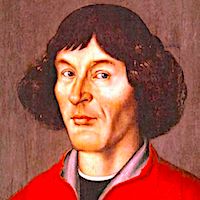
Copernicus, Nicolaus
1473 – 1543 CE
Creator of one of history's greatest revolutions
From our point of view, such a simple and obvious proposition—that the Earth rotates around the Sun. At his time and place in history, however, Copernicus created one of the most far-reaching revolutions of understanding in the history of the world. Mathematician, astronomer, physician, translator, diplomat, economist, polyglot and polymath; his celestial theory threatened the powerful Catholic Church so much it was considered an atheistic blasphemy and because Galileo agreed with it, he was incarcerated for the last nine years of his life. An early humanist, he also developed an important economic concept and theory of money, translated poems from Greek to Latin, and even became an effective and influential government official.
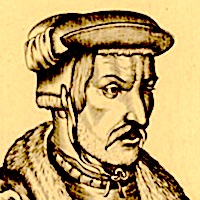
Agrippa (Heinrich Cornelius Agrippa von Nettesheim)
1486 – 1535 CE
Historian of the occult and early, important influence on science
Physician, soldier, polymath, theologian, and the most important magic occultist of his age; Agrippa pushed hard on the ideological and religious belief boundaries of his time and, as a consequence, found himself at odds with inquisitors, banished, imprisoned, and continually threatened. His books shifted historical trends. One attacking the contemporary state of science influenced writers like Goethe, Montaigne, and Descartes. A book he wrote in 1529 argued for the moral and spiritual superiority of women and his 3-volume Occult Philosophy (printed 1531-1533) became a foundational resource for Occultists then and now. In Mary Shelley's famous novel, his writing are described as a major influence on the young Victor Frankenstein and he's similarly cited in works by Christopher Marlowe, Søren Kierkegaard, and J. K. Rowling.
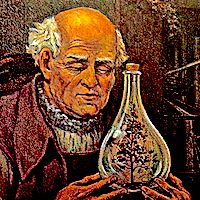
Paracelsus (Theophrastus von Hohenheim)
1493 – 1541 CE
Revolutionary, shamanistic alchemist
“Father of toxicology,” alchemist, medical revolution pioneer, and astrologer; Paracelsus was venerated by the Rosicrucians, intensively studied by Carl Jung, and revered by future physicians who universally recognize his medical contributions. He criticized the popular purging and bloodletting techniques of his time as well as the practices of applying cow dung to wounds. He revolutionized medicine by conceiving clinical diagnosis, promoting the keeping of wounds clean, anticipating Germ Theory, using specific instead of cure-all medicines, doing medical experiments on animals, treating mentally ill as treatable instead of possessed by evil spirits, discovering that syphilis is contracted by contact, that “poor blood” can be improved with iron, and creating the terms "chemistry," "gas," and "alcohol.” Jung carried on his work of alchemy as symbolic language expressing unconscious and innate psychological influences.
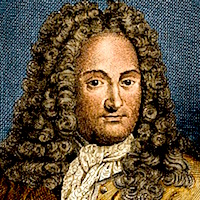
Leibniz (Gottfried Wilhelm (von) Leibniz)
1646 – 1716 CE
Polymath, philosopher, mathematician, scientist, engineer, lawyer, university president and “best-of-all-possible-worlds man”; Leibniz developed calculus, invented components that became the first calculator, and refined the binary number system that became the foundation for digital computers. His writings on law and politics and call for a European confederation inaugurated the European Union. One of the first major European intellectuals to study Chinese culture and philosophy, he read Confucius, studied the I Ching, and integrated Chinese wisdom into both his philosophy and physics. It led to his “law of continuity” that linked the nature of everyone—plants, humans, animals, both the organic and inorganic worlds—, created a theoretical foundation for evolution, and envisioned a non-dual calculus of understanding reality.
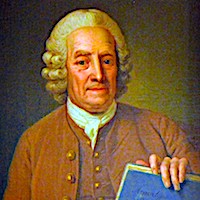
Emanuel Swedenborg
1688 – 1772 CE
Scientist, mystic, influential philosopher
A scientist, philosopher, theologian, inventor, and mystic; Swedenborg began his career as a genius-level scientist and later—detesting the materialism of his academic life—experienced visions and became a highly influential and mystical theologian. He was the first to identify nerve cells, identify the brain's cortex, and pioneered many discoveries in magnetism, phosphorescence, and brain function. His mystical visions described visits to heaven and hell, conversations with spirits from the moon, the planets in our solar system as well as with those from planets further away. His influence spread throughout Europe and into modern times through figures like William Blake, Coleridge, Emerson, Browning, and several Christian denominations.
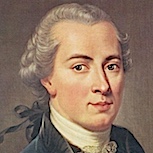
Immanuel Kant
1724 – 1804 CE
Credited with creating a paradigm shift responsible for much of modern philosophy, psychology, metaphysics, sociology, linguistics, and political theory; Kant was a quiet and introverted philosopher whose daily schedule was so precise that neighbors were said to set their watches by it. Child of the Enlightenment and father of the Romantic movement, he barely traveled but became “the central figure of modern philosophy,” inspired the American transcendentalism of Emerson and Thoreau, and a profound influence on many important thinkers like Hegel, Novalis, G. K. Chesterton, Schopenhauer, Bertrand Russell, Max Weber, Jean Piaget, and Noam Chomsky.
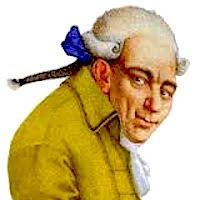
Georg Christoph Lichtenberg
1742 – 1799 CE
One of history’s best aphorists
Youngest of 17 children, scientist, professor of physics, satirist, and hunchback; Lichtenberg had a major influence on the culture of his times that extends into the modern world. He discovered tree-like electrical patterns now called Lichtenberg figures or fractals, the basic principles used now for copy machine technology, a “Compass of Motives” praised by Freud and also standardized the paper sizes now used in most of the world. Considered one of history’s best aphorists, he was read and admired by wisdom lineage holders like Arthur Schopenhauer, Friedrich Nietzsche, Sigmund Freud, Leo Tolstoy, and even Chinese scholars like Qian Zhongshu.
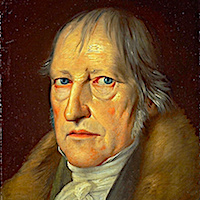
Georg Hegel (Wilhelm Friedrich)
1770 – 1831 CE
Dialectical Philosopher
influential philosopher, developer of "absolute idealism," and political theorist; Hegel worked to integrate history, religion, and art into his philosophy. This led to an integration of dualisms and an amplification of Fichte's thesis-antithesis-synthesis triad. His methods became deeply influential on both contemporary and later schools and thought leaders—even for those who strongly disagreed with his philosophy like Kierkegaard, Marx and Engels—existentialism, Historical materialism, and British Idealism. His writings—rejected and banned by both right wing and left wing politicians—became an incipient influence on many or most of the philosophical schools that came after him: Marxism, phenomenology, German existentialism, and even psychoanalysis

Arthur Schopenhauer
1788 – 1860 CE
Though mainly unnoticed during his life, after he died Schopenhauer’s work had a huge impact on psychology, literature, art, philosophy, music and science. He was one of the first Western thinkers to affirm major aspects of Eastern philosophy. He called himself a Buddhist and compared his philosophy to basic Buddhist teachings. Einstein extolled Schopenhauer’s life-long influence and he was also respected and emulated by people like Nietzsche, Tolstoy, Freud, Jung, Joseph Campbell and Thomas Mann. His influence continues today into fields like modern evolutionary psychology.
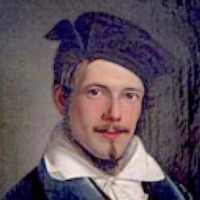
Friedrich Viktor Strauß
1809 – 1899 CE
First German Tao Te Ching translator
Theologian, poet, minister, translator, and scholar; Strauß published the first German Tao Te Ching translation in 1880. He also translated Chinese classic poetry, wrote novellas and gypsy romance. Sill popular today, his Tao Te Ching translation's 11th edition was published in 2004. His translation of the Shijing (Book of Songs) in 1880 became the first German translation. An ambassador and minister, he also translated his insight and understanding of Chinese wisdom into Western culture. Some of his hymns are still sung in churches and for weddings.
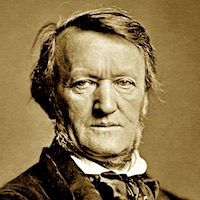
Wilhelm Richard Wagner
1813 – 1883 CE
"Music-drama" composer, revolutionary of opera, prolific writer, and forefather of psychoanalysis; Wagner blended with his music a flare for the poetic, philosophical, visual, and dramatic arts. Although famous and greatly respected, most his personal life filled with poverty, political exile, and dramatically painful love affairs. His research and insight into psychoanalytical themes like dream interpretation, the Oedipus myth, and the relationship between anxiety and sex predated Freud's birth. He became a major influence on luminaries like W. H. Auden, Thomas Mann, Marcel Proust, James Joyce, and T. S. Eliot.
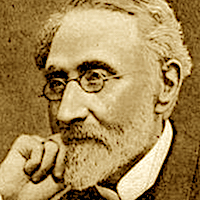
Heinrich Graetz
1817 – 1891 CE
Pioneering Jewish historian
Although Graetz became the most esteemed 19th century Jewish historian and one of the first to write a major Jewish history from a Jewish perspective, he was sued for libeling the Jewish religion and later accused of heresy. In spite of that, his history became very popular and influential. It was a ground-breaking effort and brought to the world a new interest in Jewish history. Later historians accused him of presenting a too weepy view of this history, an over-emphasis on the tragic suffering, and an ignoring of the more positive and joyful events; however, his deeply difficult and pioneering works remain.
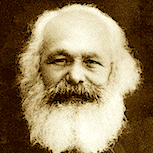
Karl Marx
1818 – 1883 CE
A journalist, philosopher, scientist, and “true founder of modern sociology” and social science; both critics and followers rate Marx as one of the most influential people in all history with a profound impact on world politics, intellectual thought, sociology and economics. A philosopher for the poor and middle classes, he described the economic conflicts of interest that alienate and polarize society between the working classes and the plutocracy. Distorted, corrupted and used by Lenin, Trotsky, Mao, and many other totalitarians; appreciated, developed, and applied by progressive political parties, labour unions, intellectuals, and artists; he brought the scientific method into politics and social theory as well as a powerful alternative to the dehumanizing aspects of capitalistic industrialization. Though questionable in many ways, his work produced a practical and powerful balancing of economic extremes, the exploitation of labor, and the corruption of politicians by the rich. Though more known for his critiques of capitalism, he also appreciated its positive impact on increased productivity, technological progress, and scientific breakthroughs.
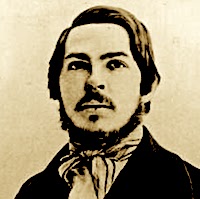
Friedrich Engels
1820 – 1895 CE
Businessman-philosopher, political theorist
Co-author of The Communist Manifesto, polyglot speaking 9 languages, businessman, poet, journalist, philosopher; Engels grew up in a wealthy family that owned and operated large factories. He saw the horrible, slave-like working conditions, long hours, environmental degradations, and child labor from a very clear, first-hand perspective. He financially supported Karl Marx, edited his writings, and wrote influential books of his own. Together they organized workers, envisioned egalitarian societies, and developed communist theory. In spite of his dedicated, political activism, in order to finance Marx’s work, he reengages in many successful business ventures. Risking imprisonment, hiding from police, and participating in armed rebellions; his efforts to create a more equitable world went far beyond theory and speculation. Although claimed as inspirational founder of Stalin’s Soviet Union, his emphasis on individuality and the appreciation of literature, music and culture set his true philosophy in direct odds against Stalin. While most of the credit for Marxist theory went to Marx, Engels—behind the scenes editing, filling in gaps, and amplifying—may have had a more important influence. He lived with the fierce, Irish radical Mary Burns for over 20 years until her death; but, because they both considered state and church-controlled marriage a form of oppression, never married.
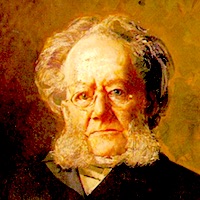
Henrik Ibsen
1828 – 1906 CE
"The world's 2nd most-performed playwright"
One of his time's most influential dramatists, Ibsen became—after Shakespeare—the world's most performed playwright. Considered a founder of theatre modernism and realism, he became on of the most influential playwrights of the 19th century. Examining the dark underside of his contemporary culture, many thought his works scandalous and they were both intensely loved and hated. The hated side forced him into poverty, self-imposed exile, and the wrath of critics. Nominated for the Nobel Prize in Literature 3 times, he became a strong influence on other influential writers like Eugene O'Neill, Oscar Wilde, Arthur Miller, James Joyce, and George Bernard Shaw. One of his plays, the 1879 A Doll’s House, became almost universally popular and was still the world's most performed play in 2006
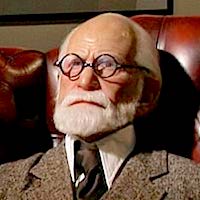
Sigmund Freud
1856 – 1939 CE
Dismissed and laughed at because of his more outlandish theories, it’s too easy to overlook Freud’s many deep insights. Founder of psychoanalysis and inspiration/influence for many of the important psychologists who came after him including Jung, Adler, Erich Fromm, Wilhelm Reich, and Fritz Perls; he developed many techniques and understandings for treating mental illness—ideas like free association, transference, the Oedipus complex, repression, libido, a theory of the unconscious, and an id-ego-super-ego psychic structure. Fromm—though critical in many ways—described Freud (along with Marx, and Einstein) as an "architect of the modern age,” believed he permanently changed the way we understand human nature, but thought psychoanalysis quickly became corrupted. Although such a famous name today, during his lifetime Freud shared some of the obscurity common to most history-changing people. His influential book, The Interpretation of Dreams (1900) only sold 351 copies during the first 6 years after publication.
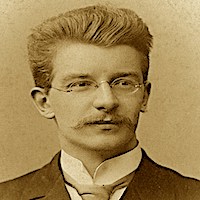
Richard Wilhelm
1873 – 1930 CE
Translator bridging East and West
Theologian, missionary, early sinologist, and personal friend of Carl Jung; Wilhelm gave us two culturally transformative translations: the I Ching and The Secret of the Golden Flower. He moved to China as a young man and lived there for 25 years. During that time, he met a sage driven out of his hermitage by the revolution—Lau Nai Suan who introduced him to the philosophy of Chinese yoga and the I Ching's psychology. This meeting and his studies produced a bridge between east and west but also a deep conflict within Wilhelm between consciousness and unconsciousness, between his Christianity and eastern philosophy.
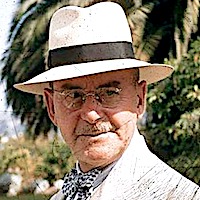
Thomas Mann
1875 – 1955 CE
Deep, psychologically insightful author
Novelist, social critic, philanthropist, and 1929 Nobel Prize winner; Thomas Mann became one of the most effective German refugees writing in opposition to Hitler and the Nazi regime in Germany. He became an American citizen and produced many anti-Nazi radio broadcasts in German for the BBC; but, in spite of that, became a target for McCarthyism, had to testify before the House Un-American Activities Committee, and was forced to stop his work for the Library of Congress, and return to Europe. His commentaries on American culture of the time being similar to "how it started in Germany." Mann carried on the philosophical tradition of Goethe, Nietzsche and Schopenhauer; passed it on to writers like Joseph Heller, Yukio Mishima, and Hermann Hesse.

Carl Jung
1875 – 1961 CE
Insightful shamanistic scientist
Psychic adventurer, fearless explorer of the unconscious, uncompromising guide to realms beyond conventional mind; Carl Jung ransacked visions, penetrated to the heart of obscure symbols, brought world culture further along the path of evolutionary consciousness. Bringer of eastern wisdom into Western culture, Jung influenced psychiatry, anthropology, archaeology, philosophy, literature, and religious studies and wrote introductions to books like the I Ching, Secret of the Golden Flower, and D. T. Suzuki’s An Introduction to Zen Buddhism. He founded analytical psychology based on what he considered the central process of human development and a central theme in the Tao Te Ching: integrating opposites.
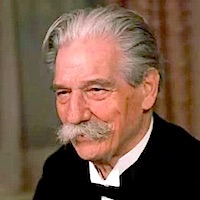
Albert Schweitzer
1875 – 1965 CE
An authentic Christian who didn't hesitate to criticize Christian extremism and hypocrisy, who genuinely practiced his faith by effective humanitarian work in Africa, and who realized a mystical and scientific union of individual and environment; Albert Schweitzer conveyed a deep reverence for all life and taught how destroying our environment is also destroys ourselves. Considered the greatest humanitarian of his day, he gave up a comfortable life as a professor and scholar to become a medical missionary in some of the world's most poverty-stricken places in Africa. After receiving the Nobel Peace Prize in 1952, he gave what many consider one of the best speeches ever given. His work against developing the atomic bomb, however, brought him under FBI/CIA scrutiny, public criticism, and the loss of financial support.

Hermann Hesse
1877 – 1962 CE
Guiding light for a world-wide cultural transition, spiritual teacher to the Beat generation, poet at heart and in life, soul of his age; Hesse was expelled from a Protestant seminary, denounced by the German media when he protested German’s involvement during WWI, and his books were banned and destroyed by Hitler. The 20th century’s most widely read European author, his books personify the balance between freedom and equality, the individual and society and the integration of opposites extolled by the non-thought lineages. After writing Nobel Prize-winning book, The Glass Bead Game, he devoted his life to mentoring young people and collaborating with peers like Thomas Mann and Carl Jung. He wrote over 30,000 letters to hundreds of different correspondents

Albert Einstein
1879 – 1955 CE
Although he made his name synonymous with genius as the father of modern physics and his E = mc2 became ”the world's most famous equation,” Einstein remained humble and unassuming. Although winning a Nobel Prize and writing over 30,000 documents, he didn’t let himself be seduced by fame and fortune but championed civil rights, non-violence, and - like Chuang Tzu and other famous Taoists - refused political honors including becoming the president of Israel. He worked hard for checking the power of nation states with a democratic global government, believed in a pantheistic god, and as an avid violin player said, “I often think in music.”
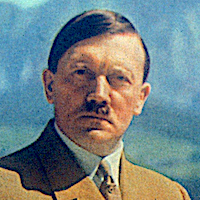
Adolf Hitler
1889
the most immoral and cruel conqueror in human history
German dictator for 12 years and instigator of both the Holocaust and World War II (the deadliest conflict in all of human history); Hitler rose to power by promoting anti-semitism, German pan-nationalism, and anti-communism. His impassioned and charismatic speeches served Nazi propaganda well hypnotizing followers into unthinking true believers. His racially motivated policies led to the killing of c. 19.3 million civilians and prisoners of war, the genocide of 6 million Jews and millions of others considered "socially undesirable." His regime is almost universally associated with the word evil, he as the most immoral and cruel conqueror in human history.
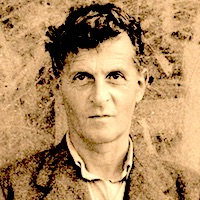
Ludwig Wittgenstein
1889 – 1951 CE
One of the world's most famous philosophers
From one of Europe's most wealthy families, Wittgenstein inherited a vast fortune and then—believing that money hinders philosophy—gave it away to artists, writers, and to his brothers and sisters. One of the world's most famous philosophers, he worked incognito teaching in remote Austrian villages and in hospitals during World War II. He kept most of his writings unpublished until after his death when his books like Philosophical Investigations became recognized as some of the most important books of 20th century philosophy. His strong influence continues today in almost every field of social sciences and the humanities.
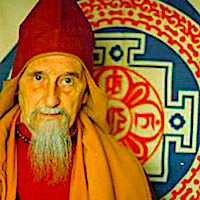
Anagarika (Lama) Govinda (Ernst Hoffmann)
1898 – 1985 CE
Pioneer of Tibetan Buddhism to the West
Poet, painter, and brave explorer of both our internal and external worlds; Lama Govinda—when only 16 years old—discovered Buddhism through the writings of Schoepenhauer. This led to a lifetime of traveling, discovering, practicing, and teaching Buddhism, and in particular, Tibetan Buddhism. An early Western initiate into Tibetan Buddhism, he traveled there in 1932 and became ordained in 1933. His writings and teachings became seminal for Tibetan Buddhism's entry into the west. Robert Thurman described him as, "one of the West's greatest minds of the 20th century. He believed he was a reincarnation of Novalis and died laughing.
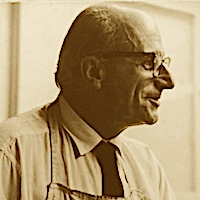
Kurt Seligmann
1900 – 1962 CE
An understanding of magic brought into the modern world
Surrealist painter, engraver, and author; Seligmann brought an openness and appreciation of mystery and magic into his art. Depicting baroque, heraldic imagery, troubadours, knights, and mythic themes; he translated his understanding of scientific magic into the visual world. During World War II, he helped artists hunted by Nazis escape from France to freedom. His art—popular with museums and collectors throughout the world—inspired an annual carnival in his native Switzerland.
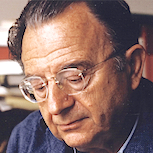
Erich Fromm
1900 – 1980 CE
One of the most powerful voices of his era promoting the true personal freedom beyond social, political, religious, and national belief systems
One of the world’s leading psychoanalyst-philosophers, “forefather of socialist humanism,” civil rights activist, and anti-Vietnam protestor; Fromm was born Jewish, became a rabbi but then came to believe that religion only breeds hatred, inequality, and discord. Becoming another “apostle of doubt,” he criticized political ideologies, cultural convictions, and all authoritarian value systems. Escaping Hitler and the Nazis in Germany, he came to the US where his talks and writings initiated the beginning of political psychology and explored the modern influences toward fascism, irrational behavior, consumerism and the “escape from freedom.” As most of our wisdom holders, he focused on unifying opposites, in particular as in his last book, paradox between “having” and “being.”
Interview with Mike Wallace
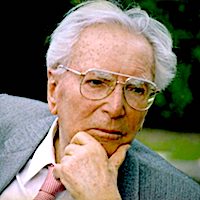
Viktor Frankl
1905 – 1997 CE
Brave and insightful concentration camp survivor
A survivor of multiple Nazi concentration camps that claimed the lives of his mother, wife, and brother; Frankl developed a psychological approach—logotherapy—based on vivid personal experiences rather than hypothetical theories. He watched how people’s ability to survive in the most horrendous situations correlated with the degree of meaningfulness they could discover as well as seeing how this mirrored his own ability to live through and survive this almost unimaginable suffering. Before his concentration camp experiences he had already focused his work on depression and suicide which successfully prevented even one Viennese student suicide in 1931. After the war, he became an important inspiration for the humanistic psychology movement, wrote 39 books translated into 49 languages, received 29 honorary Ph.D. degrees and taught in locations all over the world. He convincingly debunked the still prevalent deception of finding happiness in relaxation, vacations, and retirement; and pointed instead toward the struggles of meeting challenges, working toward goals, and—most importantly—projects that make the world a better place.

Dietrich Bonhoeffer
1906 – 1945 CE
Theologian, prolific and influential author, anti-Nazi double-agent spy, martyr, and non-thought lineage holder; Bonhoeffer worked against Hitler and the Third Reich when almost everyone around him was either seduced, bullied or exterminated and his fellow pastors were preaching, "Christ has come to us through Adolph Hitler." Leaving a safe home in America; he helped smuggle Jews into the neutral Switzerland, vocally and secretly opposed the Nazis, and was tortured and killed in a concentration camp. A deeply religious Christian, he taught a “religionless Christianity” without a metaphysical God confused by concepts and belief.
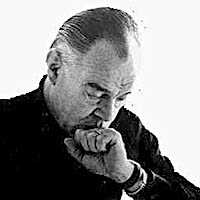
Denys de Rougemont
1906 – 1985 CE
Non-conformist leader, influential cultural theorist
Cultural theorist, prolific writer of 32+ books, and Swiss defender against Nazi propaganda; de Rougemont was an influential non-conformist of the 1930's, opponent of his era's totalitarian movements, and advocate for European federalism. His ground-breaking book, Love in the Western World, questioned and criticized Western Civilization's fascination with romantic, unrequited love. A paramour of Saint-Exupéry's Salvadoran wife, Consuelo ("The Rose"), he modeled for a Little Prince painting, wrote a Saint-Exupéry biography, and later helped Consuelo write her own autobiography.
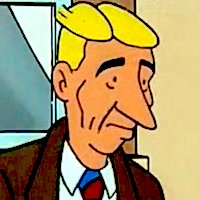
Hergé (Georges Prosper Remi )
1907 – 1983 CE
Intrepid reporter of world culture
Hergé translated world culture—from the past and future, from Native American, African, European, Mid-Eastern, South American, Chinese, and Tibetan—to a world only beginning to open its eyes to a new political and social consciousness just beginning to transcend nationalism. He created a visually engaging, highly entertaining, and wisdom transmitting art form that became one of the 20th century’s most popular publications. Although the early Tintin cartoons and books were used as propaganda by a conservative Catholic newspaper, steered away from political views during the German occupation of Belgium, and although Hergé himself was accused of racism and arrested four times; his positive impact on international consciousness steadily increased as more than 120 million Tintin books were sold and translated into 40+ languages. His travels introduced him to Asian thought which deeply influenced his message. He described his political views by quoting Chuang Tzu.

E. F. Schumacher
1911 – 1977 CE
The “People's Economist”
While working in Burma during the mid ‘50s, Schumacher developed a set of principles he called “buddhist economics” — emphasizing the idea that people need good work for proper human development. Traveling through many Third World countries, he helped governments create self-reliant economies based on local resources and needs. A pioneer and instigator in creating a philosophy of “appropriate technology,” and known as the “People's Economist,” his economic theory based on wisdom instead of only materialism, became one of the most serious alternatives to the dominant economic theories based on Adam Smith and John Maynard Keynes.
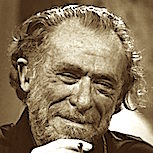
Charles Bukowski
1920 – 1994 CE
"Laureate of American lowlife”
Called "laureate of American lowlife,” “the original Big Lebowski,” “pulp-fiction hero,” and “king of the underground;” Bukowski wrote over 60 books, thousands of poems, hundreds of short stories, and was the writer behind Robert Crumb’s famous comics. Icon of the Los Angeles cultural life of his time, lover of alcohol, affairs, and outrageous creativity; he became the epitome and symbol of the anti-social, utterly free, and uninhibited bachelor. An intensely captivating and mesmerizing figure, his life and story show up in film personalities including Jean-Luc Godard, Ben Gazzara, Mickey Rourke, Faye Dunaway, Sean Penn, Dennis Hopper, Bono, Tom Waits, Julianne Moore, Jeff Bridges, Matt Dillon, and many more.
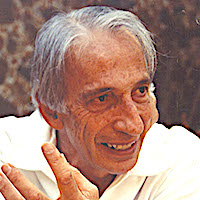
Ivan Illich
1926 – 2002 CE
"an archaeologist of ideas"
Philosophical eco-warrior, Roman Catholic priest, anarchist, polymath, "jet-age ascetic," and prolific author; Illich—working in 10 languages—critically analyzed Western culture—economics, medicine, education, transportation, development, work and energy. After becoming a priest in 1951, he signed up to work in one of New York's poorest areas with Puerto Rican immigrants. This led to a University appointment in Puerto Rico that lasted until he was fired for being too critical of the pope's anti-birth control stance. His later life became an enlivening educational experience for all within his influence.

Toni Packer
1927 – 2013 CE
A Zen teacher minus the 'Zen' and minus the 'teacher.’
Toni Packer (1927 – 2013)
Dropped-out successor to famous Zen teacher Phillip Kapleau, developer of the "meditative inquiry" practice, and founder of the Springwater Center; Toni Packer grew up in Nazi Germany needing to hide her Jewish heritage while becoming increasingly skeptical of authority. Following in the Krishnamurti lineage of spiritual anti-authoritarianism, she stopped calling herself a “Buddhist” and became "...a Zen teacher minus the 'Zen' and minus the 'teacher.’ ” Exiled from the Rochester Zen Center, she taught finding the essence, the sense, the true meaning hidden by dogma, rituals, organized religions and cultural traditions.

Gesshin Myoko Roshi
1931 – 1999 CE
Moon heart miraculous light
Rinzai Zen master as a girl known by Adolf Hitler who thought she was the perfect Aryan but whose family escaped to California; Gesshin Myoko (moon heart miraculous light) studied and taught Japanese and Vietnamese Zen. Painter, poet, calligrapher, and mystic from an early age; she led a life filled with spontaneous intuition and insight that led to meeting Sasaki Rōshi, becoming his disciple, helping him start thriving Zen centers, and becoming the head teacher. She later felt this approach was too severe and not appropriate for western students and developed her own Zen forms not tied to a particular culture, tradition or time period; but instead, connected with the particular students and environment involved.
Related Sources (0 sources)
Quotes about the Central European Lineage (8 quotes)
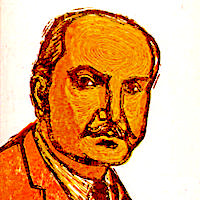
“Hebraic religion and German philosophy have... sanctioned, in the hard-working and reforming part of the middle classes, an unqualified respect for prosperity and success; life is judged with all the blindness of life itself. There is no moral freedom.”
Comments: Click to comment

“We know what the Nazis did to Jews at Auschwitz. In mass cruelty, the expulsions of Germans ordered by the Russians fall not far short of the atrocities perpetuated by the Nazis.”
Comments: Click to comment

“Unhappy German nation, how do you like the Messianic role allotted to you, not by God, nor by destiny, but by a handful of perverted and bloody-minded men?”
Comments: Click to comment
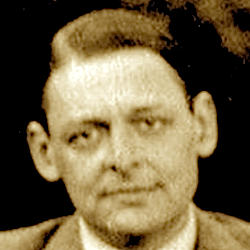
“[Aeneas] is the symbol of Rome; and, as Aeneas is to Rome, so is ancient Rome to Europe. The Roman Empire and the Latin language were not any empire and any language, but an empire and a language with a unique destiny in relation to ourselves...”
Comments: Click to comment

“We do not want any other god than Germany itself. It is essential to have fanatical faith and hope and love in and for Germany.”
Comments: Click to comment

“Had Japan been a tenth as wise as Abraham Lincoln, had Hitler been a hundredth part as sensible, we today, the United States and England, would not have a chance in this war. .. But they have lost because they attacked lands already free, and because they have enslaved peoples accustomed to freedom. By this one thing alone, if by no other, they are doomed. They have misread the hearts and minds of men.”
Comments: Click to comment
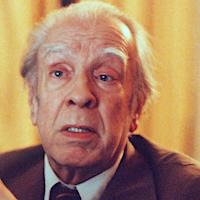
“When the Germans were defeated I felt great joy and relief, but at the same time I thought of the German defeat as being somehow tragic, because here we have perhaps the most educated people in Europe, who have a fine literature, a fine tradition of philosophy and poetry. Yet these people were bamboozled by a madman named Adolf Hitler, and I think there is tragedy there.”
Comments: Click to comment
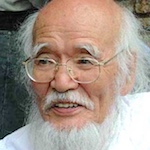
“the decline of European civilization arises from the Western philosophy of placing onesef first; that in trying to protect one's person with a stone castle Europeans have ended by enclosing the self within a prison.”
Comments: Click to comment
Comments (0)